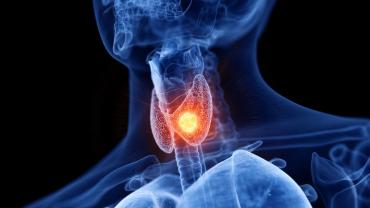
The thyroid-gut axis refers to the bidirectional communication between the thyroid gland and the gut microbiome. It involves biochemical interactions between the immune system, gut microbiota, and the thyroid. Emerging research suggests that the thyroid-gut axis may play a pivotal role in the regulation of thyroid function and the immune response.
The gut microbiome may influence several aspects of thyroid health including thyroid hormone metabolism and inflammatory responses. The availability of certain micronutrients that are essential for thyroid functioning is also influenced by the gut microbiome. In addition, thyroid hormones may modulate certain aspects of the gut microbiome, including microbial composition and diversity. Preliminary evidence suggests that dysregulation of the thyroid-gut axis may contribute to certain thyroid-related disorders.
A recent clinical study explored the potential role of gut microbiota in the presence of Graves Disease (GD) or Graves’ orbitopathy (GO). GD is an autoimmune thyroid condition and is the most prevalent form of hyperthyroidism. The study outcomes reveal shifts in gut microbiome composition in GD/GO individuals, including increased Prevotella, Lactobacillus, and Veillonella populations, alongside reduced microbiome diversity. The dysbiosis associated with GD/GO may be linked to the imbalance between T helper 17 (Th17) cells and regulatory T cells and antigenic mimicry. In animal studies, increases in the incidence of autoimmune conditions have been observed in germ-free mouse models.
Animal studies indicate that selenium may help increase gut microbial diversity. Selenium is an essential trace element that has been shown to support healthy thyroid hormone metabolism. It may also support a normal immune response and antioxidative status. The thyroid gland can be particularly vulnerable to oxidative damage. Clinical studies also indicate that supplementation with selenium may support healthy levels of antibodies associated with autoimmune thyroiditis. The genus Akkermansia may help support immune health, gut barrier protection, and metabolic function. In animal models, it has also been linked with supporting health in the presence of GO.
A six-month clinical study involving supplementation with Bifidobacterium longum in individuals with GD, alongside prescription medication, reported improvements in TSH receptor antibody levels and improvements in thyroid function and diversity among gut microbiota, with increases in short-chain fatty acids. However, the study’s small sample size indicates that definitive clinical conclusions cannot be made and that more research is needed.
Studies indicate that certain nutraceuticals such as selenium and vitamin D may also help support thyroid function and immune health. In addition, diets rich in fruits and vegetables, particularly those high in polyphenols and myo-inositol may help support healthy thyroid hormone balance, immune health, antioxidative status, and a normal response to inflammation.
By Cory Ambrose, ND, MAT